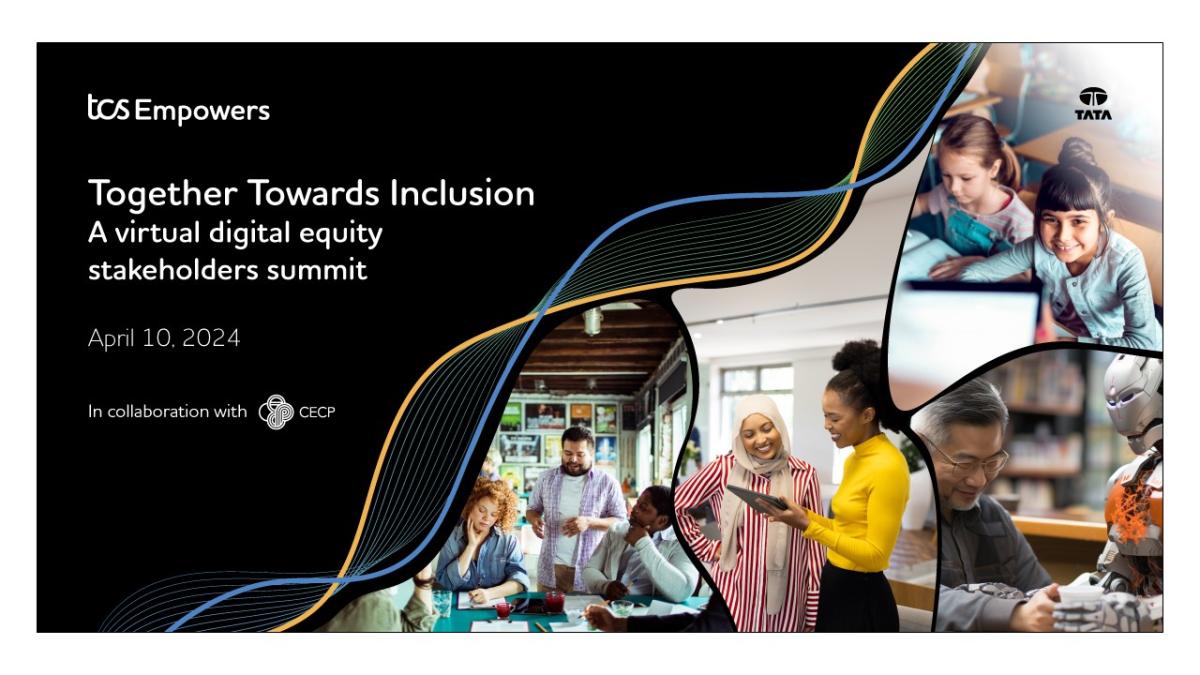Together Toward Digital Inclusion: The Only Route From Here
by Katie Levey

While most of us take the opportunity benefits of our access to the internet and the devices that connect to it for granted, there are people in our community who lack those advantages completely. These individuals and families may not own a computing device or, if they do, they may not have access to high-speed internet that so many daily tasks in our lives require. These people can’t fully participate in the digital economy at the highest level. Being on the wrong side of the digital divide, they also miss other significant opportunities and face setbacks as a result.
On April 10, Tata Consultancy Services (TCS) and Chief Executives for Corporate Purpose (CECP) will bring stakeholders currently working on related projects together to address this critical societal challenge. We have one goal in co-hosting Together Toward Inclusion: A Digital Equity Stakeholder Summit: to find ways we can jointly advance equitable digital inclusion on the path toward true and lasting digital equity.
Equitable digital inclusion is a start toward achieving the conditions for what TCS Corporate Social Responsibility leaders consider their North Star: digital equity. It makes people’s lives easier and positions them for greater contributions to their households and the economy. It also gives them a chance to take control of their physical and financial wellness.
The reason for the TCS-CECP convening is clear. In an evolving global landscape full of technological change, the evolution of digital skills is a top priority. Businesses and the skills-development companies serving them know this well. Large employers invest in getting the right technologies in place so they can succeed in their markets and with their stakeholders, shareholders and analysts. They also invest in skilling their employees in ways that will support these efforts. For businesses, it’s a matter of daily practice.
But what about those who could fall further behind as technology advances?
Among other things, achieving digital equity depends on access to adequate and affordable internet service, the availability of affordable devices and accessibility features for those who are differently abled. Once these basics are in place, skills take the spotlight as an ongoing concern. In a world where tech advances are fast and furious, people must constantly develop their digital literacy. Digital access and skills, or the lack thereof, have implications for job and wealth creation, access to health and education, and areas of life such as financial and civic inclusion. In other words, it is critical.
TCS believes that considerable progress can be made in all of these areas, bringing us closer to equality for people of all genders, races, and socio-economic levels of society. To get there, stakeholders must work collaboratively to eliminate technological barriers to learning, job acquisition, civic engagement and health care. That means taking on the largest challenges now and putting the same energy into a lasting commitment to stay on top of advances in technology.
Every time technology advances, somebody’s currently high-level digital skill set runs the risk of quickly becoming obsolete, putting people at risk of being left behind. For example, limited AI literacy could restrict people from participating in health pursuits, succeeding at work or confuse them when trying to find accurate information on which to base their purchasing, banking or civic-engagement decisions.
The path to digital equity is far more than any one business, government or NGO can undertake alone, but collaboration itself can encourage optimism. We’re inviting digital equity stakeholders currently working on digital equity, as well as those who want to engage in this important work, to attend our half-day summit on April 10. I hope you’ll join us. Working “Together Toward Inclusion” can bring efficiency, innovation and effective frameworks for collective action. It can change the world.
Katie Levey, of Tata Consultancy Services, is the global program director of Digital Empowers, TCS’ social impact thought leadership program. Digital Empowers coordinates meaningful convenings of stakeholders interested in technology's impact on sustainable development.

